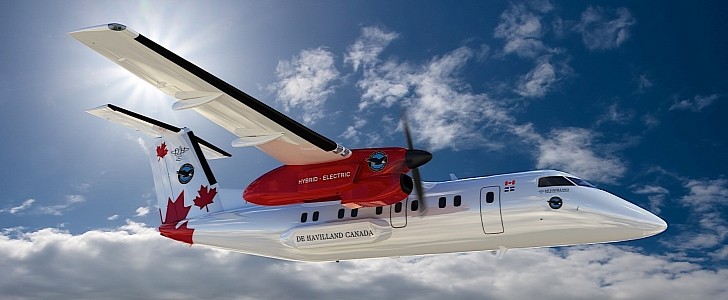All the efforts made in the auto industry to allow for the transition from internal combustion engines to electric power would probably amount to nothing in the grand scheme of things, if other industries don’t jump on the bandwagon. Luckily, they seem to be doing exactly that.
The aviation industry, although essential to the wellbeing and functioning of our world, is one of the biggest sources of greenhouse gas emissions. But it’s trying to change that, either through the adoption of new, cleaner fuels or by devising new means of propulsion for airplanes.
Pratt & Whitney, one of the giants of the industry, is going for the latter approach and announced in the summer of last year a massive investment for the development of hybrid-electric propulsion technology and a flight demonstrator program for it.
The goal is to come up with an airplane that could cut fuel consumption and CO2 emissions by 30 percent compared to a modern regional turboprop airliner. Part of the powertrain is being developed by Collins Aerospace, which announced last month the one-megawatt electric motor and motor controller being imagined for the Pratt & Whitney machine completed its the Preliminary Design Review.
Being put together at the Solihull facility in the United Kingdom, the motor will eventually make its way onto a De Havilland Dash 8-100 experimental aircraft. Once installed, it will work together with a Pratt & Whitney fuel-burning engine for a total output of 2 megawatts, with a 50/50 power split. The electric motor will also supply extra power during take-off and climb, while the internal combustion powerplant is designed to fully run on Sustainable Aviation Fuel (SAF).
The technology should be ready for in-flight testing sometime in 2024, with flights scheduled over Montreal, Canada. Until then, Collins plans to take the electric motor through more procedures, starting with ground testing later in 2022.
Pratt & Whitney, one of the giants of the industry, is going for the latter approach and announced in the summer of last year a massive investment for the development of hybrid-electric propulsion technology and a flight demonstrator program for it.
The goal is to come up with an airplane that could cut fuel consumption and CO2 emissions by 30 percent compared to a modern regional turboprop airliner. Part of the powertrain is being developed by Collins Aerospace, which announced last month the one-megawatt electric motor and motor controller being imagined for the Pratt & Whitney machine completed its the Preliminary Design Review.
Being put together at the Solihull facility in the United Kingdom, the motor will eventually make its way onto a De Havilland Dash 8-100 experimental aircraft. Once installed, it will work together with a Pratt & Whitney fuel-burning engine for a total output of 2 megawatts, with a 50/50 power split. The electric motor will also supply extra power during take-off and climb, while the internal combustion powerplant is designed to fully run on Sustainable Aviation Fuel (SAF).
The technology should be ready for in-flight testing sometime in 2024, with flights scheduled over Montreal, Canada. Until then, Collins plans to take the electric motor through more procedures, starting with ground testing later in 2022.







